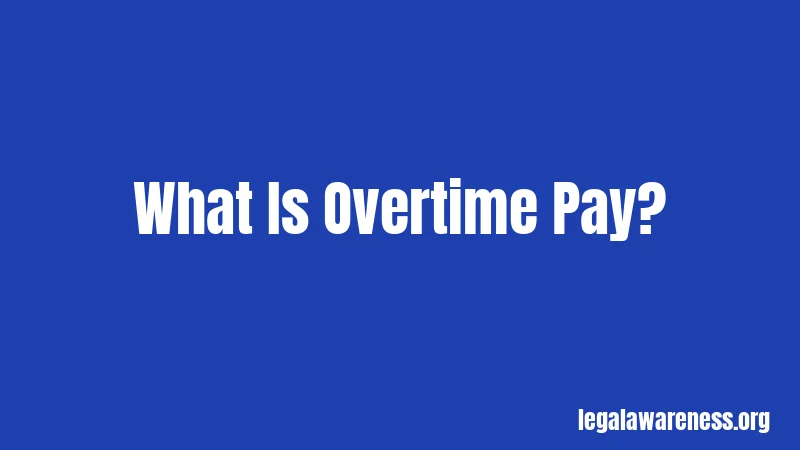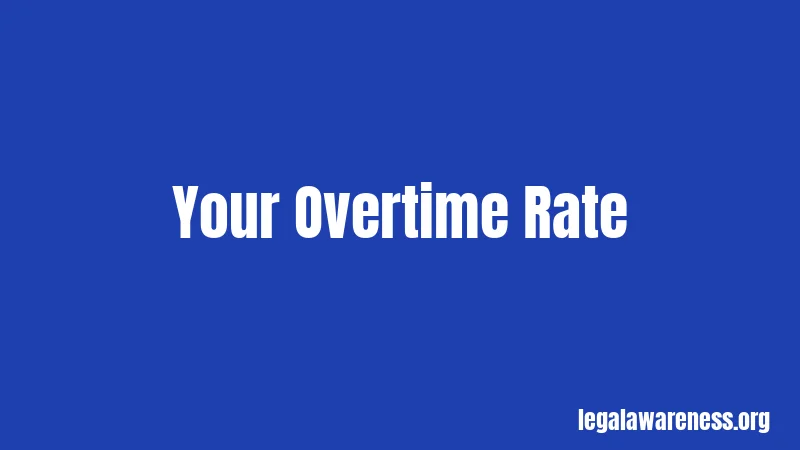New Jersey Overtime Laws (2026): What Your Paycheck Should Include
Most people have no idea what they’re actually owed when they work extra hours. Seriously. But in New Jersey, overtime laws are pretty specific. And if your employer isn’t following them? That’s money out of your pocket.
Here’s the good news. Once you understand these rules, you’ll know exactly what you should be getting paid. Let’s break it down.
What Is Overtime Pay?

Overtime is extra money you earn when you work more than a certain number of hours. Think of it like a bonus for going beyond your normal schedule.
In New Jersey, the rules are pretty straightforward. You’re working overtime whenever you go over the limit. Your employer has to pay you extra for those hours. This is called the overtime rate, and it’s usually higher than your regular pay.
Why does this exist? Basically, it’s designed to reward hard work. It also encourages employers not to overwork their staff. Pretty fair, right?
How Many Hours Count as Overtime?
Okay, here’s where it gets interesting. New Jersey’s rules are different from federal rules. And that matters.
In New Jersey, you earn overtime pay after working more than 40 hours in a single week. One week. That’s the key threshold.
But wait, it gets better. You also get overtime if you work more than 10 hours in a single day, even if you haven’t hit 40 for the week yet. So if you work a long shift on Monday, you’re getting overtime for those extra hours. Then the daily overtime works like this: your first 10 hours of the day are regular pay. Hours 11 and beyond are overtime.
Here’s something important. If you hit both the daily and weekly limits, your employer doesn’t pay you twice. You get the better rate, but not double. Makes sense, right?
Your Overtime Rate

So how much is “overtime pay” exactly? This is crucial information.
Your overtime rate is one and a half times your regular hourly wage. People call this “time and a half.” If you normally earn $20 an hour, your overtime rate is $30 per hour. Simple math, big difference.
Honestly, this is the part most people miss. Some employers try to avoid paying the full rate. Don’t let that happen to you. You’re legally entitled to this amount.
Salaried Employees and Overtime
Wondering if salary employees get overtime too? Great question.
Many people assume that because they’re salaried, they don’t get overtime. They find out the wrong way. Here’s the truth: New Jersey doesn’t really care if you’re salaried or hourly. What matters is whether you’re “exempt” from overtime laws.
Most salaried employees actually qualify for overtime. You’re only exempt if you make a certain amount and do certain types of work. We’re talking about managers, professionals, and executives who make decent money and make important decisions.
But hold on. Not all managers are exempt. Not all professionals either. The state looks at your actual job duties, not just your title. Your boss can’t call you a “manager” and skip overtime pay if you’re really just a regular worker with a fancy title.
Stay with me here. If you’re not sure whether you’re exempt, that’s exactly when you should ask for clarification. In writing. Your employer should explain why they think you’re exempt. If they can’t give you a solid answer, they probably owe you overtime.
When You Don’t Get Overtime

Not every job pays overtime. There are actual exceptions.
Farm workers, domestic workers, and some seasonal employees are excluded. Outside salespeople don’t get overtime. Neither do some workers in healthcare settings. The list is specific, and it’s relatively short.
The key question: does your job fall into one of these categories? If it doesn’t, you get overtime. It’s really that simple.
Fluctuating Work Weeks
Sometimes people work different hours each week. One week is 35 hours, the next is 50 hours. What happens then?
Here’s how it works. Each week stands on its own. If you worked 35 hours one week, you get regular pay for all 35. The next week, if you worked 50 hours, you get regular pay for 40. Then you get overtime for the extra 10.
This matters because some employers try to average things out. They’ll say, “You worked 35 hours last week and 45 this week, so you average 40.” Wrong. That’s not how New Jersey law works. Each week is separate.
Personally, I think this rule makes sense. It protects workers from being pushed into overtime and not compensated for it.
Meal Breaks and Overtime
Pause. This is important to understand correctly.
If you take a meal break, that time doesn’t count toward your hours. A 30-minute lunch? You don’t pay for it, and it doesn’t count toward your 40 hours. That’s standard.
But here’s where it gets tricky. You must actually be relieved of all duties during that break. If you’re working while eating, or if you’re on call, those minutes count toward your hours. This matters for overtime calculations.
Think of it like this: the break only counts if you’re truly off the clock. If you’re doing anything work-related, those hours count.
Your State Overtime vs. Federal Overtime
You might have heard of federal overtime rules too. They’re different from New Jersey’s.
Under federal law (called the FLSA), you get overtime after 40 hours per week. There’s no daily overtime rule at the federal level. New Jersey, though, gives you daily overtime protection too. That’s actually better for workers.
When federal and state rules conflict, you get whichever one is better for you. Your employer can’t use the federal rule as an excuse to avoid New Jersey’s rules. The state rules apply because they’re stricter.
Penalties and What Happens if You’re Not Paid Overtime
So what if your employer refuses to pay you overtime? This is where things get serious.
You can file a wage claim with the New Jersey Department of Labor and Workforce Development. You’re not asking for permission. You’re reporting that money was stolen from your paycheck. That’s what it is.
If you win your case, you get back all the overtime pay you were owed. That’s called unpaid wages. But it doesn’t stop there. You can also get something called “liquidated damages.” This is basically a penalty that equals the amount you were owed. So if you were owed $5,000, you could get $10,000 total. One original amount plus a penalty.
There’s more. Your employer has to cover your attorney’s fees if you hire a lawyer. You also get interest on the unpaid wages. Over time, this adds up fast.
Here’s what makes this serious. New Jersey takes wage theft seriously. Employers know that. Most employers pay overtime correctly specifically because the penalties are so stiff.
Not sure if you’re being paid correctly? Document everything. Keep records of your hours. Write down when you worked and for how long. Save your paystubs. This evidence will help you if you need to file a claim.
Bonuses and Overtime
A question that comes up a lot: do bonuses affect your overtime rate?
Not exactly. Here’s how it works. Most bonuses don’t change your overtime calculation. You get your bonus separately. Your overtime rate stays based on your regular hourly wage.
But there are exceptions. If you get a bonus that’s tied to hours worked, it might count. This gets complicated, honestly. If you’re not sure, ask your human resources department to explain. Get it in writing if possible.
Recent Changes and Updates
New Jersey overtime laws have stayed pretty stable over recent years. The state hasn’t made major changes to how overtime is calculated since the last update in 2008. That means the 40-hour and 10-hour rules have been consistent for a while.
However, there have been discussions about raising wages and updating protections. As of 2026, the rules remain as described here. But it’s smart to check the New Jersey Department of Labor website regularly. Laws can change, and you want to know if they do.
How to Calculate Your Own Overtime
Want to make sure you’re being paid right? You can do the math yourself.
First, count your hours for the week. Write down every day you worked and how many hours. Be accurate. Next, check for daily overtime. Did you work more than 10 hours any single day? If yes, anything over 10 that day is overtime at the 1.5 rate.
Then check for weekly overtime. Did you work more than 40 hours total that week? Hours beyond 40 are overtime. But remember: don’t double count. If those extra hours were already counted as daily overtime, don’t count them twice.
Finally, multiply your overtime hours by your overtime rate (1.5 times your regular rate). Add that to your regular pay (40 hours or however many regular hours you worked, times your regular rate). That’s what you should be getting paid.
If You Work Multiple Jobs
This question surprises people sometimes. What if you work two different jobs in New Jersey?
Each employer calculates your overtime based on hours at their company only. Your job at the restaurant doesn’t affect overtime calculations at the retail store. Each employer looks at their own hours, period.
This might sound unfair. You could work 30 hours at one job and 30 at another, hitting 60 total, but get no overtime because each employer sees 30 hours. And legally, that’s actually correct under New Jersey law. Each employer operates separately.
What About Overtime for Independent Contractors?
Here’s something to know: independent contractors generally don’t get overtime protection.
If you’re classified as a contractor, you negotiate your own rate. There’s no automatic overtime. However, New Jersey has been cracking down on misclassification. Some employers call people “contractors” when they’re really “employees.”
How do you know the difference? Real contractors control how and when they work. They work with multiple clients. They provide their own equipment. Employees, on the other hand, work on a schedule set by the employer.
If your employer controls when you work, what you do, and how you do it, you might actually be an employee. That means you’d get overtime protection. This is worth investigating if you’re in this situation.
Double-Checking Your Paystub
Okay, practical stuff now. How do you actually verify you’re being paid correctly?
Look at your paystub. It should show your regular hours and your overtime hours separately. You should see two different rates. Your base pay is regular time. Then there’s a separate line for overtime at the higher rate.
If your paystub doesn’t break this down clearly, ask questions. Your employer should be able to explain exactly how they calculated your pay. If they can’t or won’t, that’s a red flag.
Also check the math. Some people notice mistakes when they do this themselves. An error in your favor is great, but errors against you happen too. Don’t assume the computer is right. Do the math.
Resources for Help
Not sure what to do? You’re not alone. Here are places to get answers.
The New Jersey Department of Labor and Workforce Development has tons of information on their website. They can also help you file a wage claim if needed. There’s no cost to file. Call them if you have questions. You can also submit questions online through their website.
If you need legal help, consider contacting a legal aid organization. New Jersey has groups that provide free legal help to people who can’t afford lawyers. Search “New Jersey legal aid” for options near you.
Frequently Asked Questions
Can my employer require me to work overtime? Yes, your employer can require you to work overtime in most cases. However, they must pay you the overtime rate for those extra hours. You can’t be punished for refusing, but they can schedule you differently next week.
Do I get overtime if I work 6 days instead of 5? Not automatically. It depends on your total hours. Work 6 days and hit 40 hours for the week? No overtime yet. But if those 6 days add up to 45 hours, you get overtime for the extra 5 hours.
What if I forget to clock out? Your employer still owes you overtime if you worked it. Document when you worked in writing if your clock isn’t accurate. Keep records of your hours even if the system seems wrong.
Does vacation time count toward my 40 hours? No. Only hours you actually worked count toward the 40-hour threshold. Vacation, sick leave, and holidays don’t count toward triggering overtime.
Can my employer make me take comp time instead of overtime pay? No. In New Jersey, you must be paid in money for overtime hours worked. Comp time (getting time off instead of extra pay) is not allowed.
Final Thoughts
Now you know the basics about New Jersey overtime laws. The big takeaways: you get overtime after 40 hours per week or 10 hours per day. Your overtime rate is 1.5 times your regular pay. Your employer has to pay it. If they don’t, the law has serious penalties in your favor.
Stay informed about your rights. Keep records of your hours. If something doesn’t seem right with your paycheck, ask questions. And when in doubt, check with the New Jersey Department of Labor or talk to a lawyer. You’ve earned that money. Make sure you’re getting it.
References
New Jersey Department of Labor and Workforce Development – Official state labor department with overtime information and wage claim filing
Federal Labor Standards Act (FLSA) Information – Federal overtime rules for comparison with state rules
New Jersey Wage and Hour Laws – State-specific overtime and wage requirements
New Jersey Legal Services – Free legal help for those who qualify
State Employment Laws Summary – Comprehensive overview of New Jersey worker protections
